This is the second half of a piece about my tour of four Israeli settlements in mid-January. The first half is here.
Shiloh
The first order of business in my third settlement is to get a bottle of wine. Avi drives me down the hill to visit the wine presses of a fellow American immigrant. We pass a group of Palestinian workers leaving a building site with a Jewish security guard and Avi shakes his head over the practice.
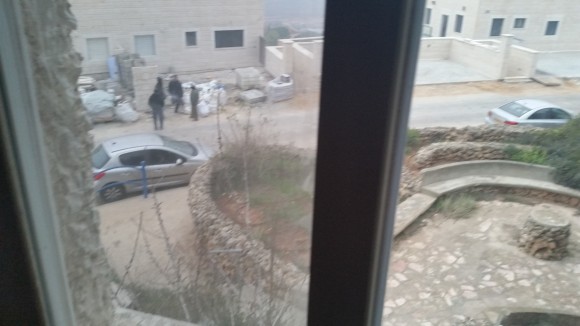
From the window of my room in Shiloh settlement, I took this photo of Palestinian workers at the unfinished house across the way, awaiting their ride back to settlement gates at end of day. January 15, 2016 (Photo: Philip Weiss)
“The policy here is you can’t employ Palestinians from neighboring villages because they will get to know Shiloh too well and if they ever pop off, they will know the community’s vulnerabilities,” he explains. “Though why you would want to hire people who want to kill you– I don’t understand it.”
The winemaker has a substantial workshop with a pergola, a studio, and a lordly view. He beats me for $20 for his Merlot. “No sulfides,” Avi says. “And the yeast isn’t added. It’s the yeast that God put on the grapes.”
Avi’s religiosity mixes with the lithe boyish movements of a former dancer. He grew up outside Chicago and wears jeans and a rough cotton shirt and a skullcap. In the U.S. he would read bohemian/outdoorsy. You’d never think he has seven children.
We sit in the kitchen with two of his grand-daughters, then when the sun goes down he pours shot glasses of bourbon that he and a neighbor distilled, and tells me his story. It is utterly plausible, though formed by strong currents: Avi’s objections to American materialism, assimilation and anti-semitism. When Avi was young, a neighboring boy told him he wanted to be president. “President Feigenbaum? Really?” Later his dance company wouldn’t let him take off for the Sabbath, and he understood that Americans didn’t tolerate Jewish culture. And the American treatment of women seemed disrespectful to him. His New Jersey-born wife Rachel covers her hair, because the hair is something only a husband should see. Avi was fervently against the Vietnam War and the whole idea of guns, but when he came over here he didn’t feel that way at all, and joined the army for the sake of the Jewish people.
There are only two real Jewish communities left in the world now, and the American one is slowly evaporating, Avi says. He and his wife have four brothers between them and they’re all married to non-Jews and losing touch with Jewish tradition. The Jews are fleeing France; a lot of them are turning up in these hills. “A Jew belongs here,” Avi says. David Ben-Gurion once said that too. In the stairwell is a bigger-than-lifesize painting of the Zionist patriarch holding a long shovel handle. The painter is another American immigrant who left his job at the Jerusalem Post years ago after getting in hot water for suggesting how to kill Yasser Arafat.
The Merlot turns out to be very good. We drink the wine over a humble dinner. Roast beets, fennel and sweet potato. Baked potatoes. A simple salad.
Avi and Rachel lead a simple life, without a lot of things. They seem both judgmental and jealous of American materialism. It takes special people to be settlers; people who don’t mind great adversity and resistance. Avi states a biblical mantra that motivates the settlers. “Two things are won, or achieved, only through struggle. Torah, and the land of Israel.”
Theirs is a traditional community; everyone in the settlement seems to be involved in everyone else’s business. When I ask how many settlers have woodstoves, Rachel and Avi name the six or seven other families one at a time.
I ask Rachel how she’d feel if one of her children ended up living in Tel Aviv. She gets a queasy smile and says she’s not sure.
“We’re making the country more stable. It’s only so wide and surrounded by a sea of people, most of whom don’t want us here, a lot of whom want to kill us. So we’re the front lines. A lot of people in Tel Aviv don’t understand that. They have internalized the fact that people don’t want us here. They never even come here. But we are doing the work of the Jewish people.”
Avi says the Israeli government has two answers to the so-called occupation. One is to go along pretty much as things have been going—because hey, there are far worse things happening in the Middle East. The second is annexation. Avi is for annexation. He says the idea of Palestinians is a fiction.
“They’re Arabs!” he says. “What did Palestinian always mean? It meant Jews! We gave them 70 percent of Palestine already. That’s Jordan. Let them have Palestine there.”
I find Avi’s analysis of Israeli society to be more astute. He explains why the government and the bulk of Israeli Jews are behind the settlement project.
“Let’s leave the Palestinians aside, that’s a whole other question,” he says. There are three broad strains in Israeli Jewish life. First, the secular elites. The Ashkenazi socialist founders of the society threw their tefillin (prayer wrappings) off the boat when they sighted the new country in the 1930s. They were done with rabbinic Judaism. They founded the parties that later made up Labour. But they discriminated against the Mizrahim, the Jews from Arab countries, and the orthodox; and they miscalculated Israeli security in the ’73 war. So Likud rode all those forces to victory in the late 70s.
Today, Avi says, the three strains are all getting along. Mizrahi and Ashkenazi marry without an eyebrow being raised. Avi is religious, but one of his sons is going out with a secular girl. There are more and more signs of secularism even in Shiloh: some women are not covering their heads.
As for the secular left, it is folding into the right because it has stopped pushing a Palestinian state, knowing that it would threaten Israeli security. Avi and the kibbutzniks I stayed with the night before all share a core belief: they are Zionists. They believe in the need for a Jewish state in the (biblical) land of Israel. Zionists revived the Hebrew language and Jewish ritual in this land; and seculars are immersed in Torah, even if they don’t go to synagogue.
“Their children will be Jews. That’s what matters,” Avi says. That’s more than his brothers and brothers-in-law back in the States can say.
We never do get to the Palestinian constituents of Israel.
Zionism is alive and well, Avi says. “Zionist means, Jews need to govern themselves, and they need a safe place. They have never done well with the goyim, we’ve always been attacked by them.”
“That’s why my mother had six kids,” I say. “One for each million.”
Rachel puts her hand to her chest. “Was she a survivor?”
“No but it sometimes felt that way.”
“Well, if you’re connected Jewishly, you understand that,” she says.
“What if I say, we’re getting along fine with goyim in the U.S.?” I say.
“I say, good luck!” Avi says. “The campuses are a scary place to be Jewish. You can be attacked there– what I see of Arabs on campuses! We’re not safe in Europe. It has a long history of attacking Jews. And there’s still anti-semitism in America.” He tells me of country clubs and neighborhoods in Chicago that exclude Jews. Though when I ask if I could move to Shiloh with my non-Jewish wife, Avi says that wouldn’t be allowed.
He fills the woodstove for the night and we sit and stare at the fire.
“I’ll tell you something,” he says musingly. “If the world would just stop having wars for ten years, and stop all the accusations against us—then we would divert all the money we spend on the military to other uses, and we would cure cancer.”
Rachel nods. “And ALS too.”
When I brush my teeth I get a brief glimpse through Avi and Rachel’s door of Rachel’s loose hair in silhouette. She’s removed her covering for the night. I feel a wave of guilt, mixed with pity.
In the morning I find out who I displaced in my bedroom. Mikhael got home late from Jerusalem and slept on the couch. He’s got long thick dark hair and wears track pants, and when his mother comes in he flops over her shoulders and lap. He looks like a hippie, with leather thongs and a shark tooth necklace. But he’s looking forward to going into the army. “I want to play with tanks, planes and boats,” he murmurs in an adolescent slur.
The boy stretching half-naked in front of his parents before the fire feels insular and intimate, and I’m a modern. It’s time to get going.

From my window, my settler host tells me we are looking at five settlements, Maale Levona, Givat Harel, Ariel, Eli, and in the foreground, Shiloh. (Photo: Philip Weiss)

Giv’at Asaf is a small settlement pocketed off the road in the Judean Hills near Shiloh and Ofra. Built on Palestinian land, it has blocked Palestinian villagers’ access to Highway 60, which adjoins photo (Photo: Philip Weiss)
Ofra
When I first visited Israel ten years ago, my mother’s best friend who had moved to Jerusalem gave me a knit yarmulke of the nationalist variety so as to observe the Sabbath at her house, and it’s done me great service since. I spend the next day wearing it. Ofra is an orthodox settlement that shuts down completely for the Sabbath. It appears that everyone in the settlement walks through the streets to various shuls. I go to synagogue Friday night, about 200 feet from my front door. The women are invisible to me as we worship. The men are all in white shirts. Except for a guy who comes in late with luxuriant hair and a beautiful blue velvet jacket, accompanied by his son in a double-vented suit. It’s obvious they recently immigrated from France.

The gate of Ofra settlement closes the orthodox community for the Sabbath, Jan. 15, 2016 (Photo: Philip Weiss)
How safe can they feel here? Several worshipers have handguns tucked into their waistbands. I count five handguns. One of the men who’s carrying lays a semi-automatic rifle at his feet. He’s got round shoulders and could be an accountant in the States. Two other worshipers walk by with rifles dangling off their shoulders. I’ve talked to enough settlers now to know that they believe Jews have a right to live without fear wherever they please in the biblical land of Israel. But this feels like Algiers.
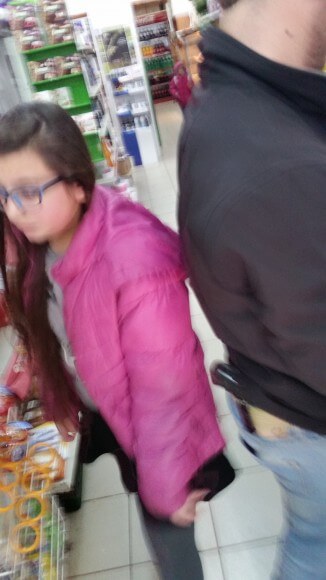
A gun in my neighbor’s waistband in the supermarket line at Ofra settlement, before Sabbath, January 15, 2016 (Photo: Philip Weiss)
My apartment is costly ($147) and in an affluent neighborhood. It belongs to a young Jewish scholar of some renown. He left at noon for the Sabbath but before going he brought me dates and a muffin and told me that Avi is right: Israeli Jews are largely unified behind a policy of continuing the occupation as it is, or annexing portions of the West Bank.

Breakfast of dates and muffin in Ofra settlement (Photo: Philip Weiss)
“Maybe give Arabs partial citizenship within those areas as they learn to live with us. And then allow them to vote,” he says. “The problem with Oslo is that it did not make peace. It created problems all over– Palestinian expectations of a state that were not fulfilled. And Israelis came to the understanding they could not live with a Palestinian state that was hostile. Look at Gaza. If Israelis could have seen a way that a Palestinian state would be peaceful and accepting of Israel, then Oslo would have worked. You could have removed 400,000 settlers. I can’t imagine a way to remove them now.”
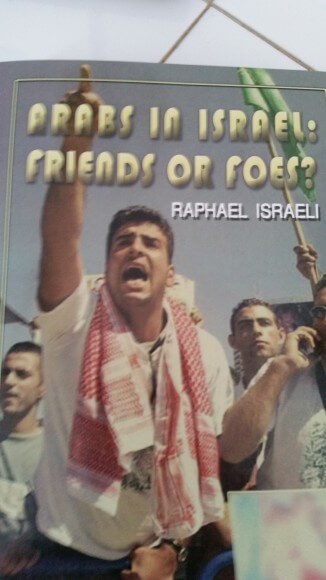
Book published by Ariel University at my apartment in Ofra settlement. (Photo: Philip Weiss)
The walls are filled with books, and after synagogue I take down some of the English volumes. A book on Palestinians published by the settler school, Ariel University, says that Palestinians should be grateful to Israelis for their high standard of living but they’re a fifth column. “The Arab minority is fortunate that it is not located in some remote country in which the world has no interest.”
A book on Israeli mammals has a horrifying story about how Arabs allegedly treated hyenas. They’d catch a hyena, blind it with a hot steel rod, and put it in a tiny cage, 30 inches by 24. “The cage with its hyaena was wheeled to fairs and festivals and for paying a certain sum people were permitted to hit and to beat the hyaena. Therefore these hyaenas uttered their continued, weird wailing fear calls as soon as they heard or smelled approaching people.”
I fall asleep and wake up to voices and laughter. Someone must have left a radio on. It’s 11 o’clock and when I go to the back window, I see a dozen children sitting in the street chattering. I walk out to join the fun. Kids are everywhere, sitting in a traffic circle, clumped in a bus stop, playing dodge near the synagogue. Groups of older boys and girls walk by in heated discussion. This is what the Sabbath is all about. Everyone is relaxed, the children flood out into what they have for private social space.
The simple pleasures of the night makes me grin. Later I realize that I have never seen a television in all my time in the settlements.
******
My host has put out the word, and the next day after synagogue I get invited to a Sabbath lunch down the road– come at 12:30. Another guest and I sit in the living room as the women prepare the meal. He’s a doctor, and I tell him what I have learned about the settlements being the natural continuation of Jewish colonization of the land. He agrees, saying that the liberal Zionists of the first stage of Israel “did much worse” than the settlers.
“In Yafo and Haifa they expelled the Palestinians. Pushed them out and took their land. We did nothing like that. These communities are built on state land. We took no Palestinian villages here.”
The doctor says there is now consensus in Israeli Jewish life that these communities will never leave. Even a liberal Zionist judge, Edmond Levy, has ruled them legal. Of course the world still acts as if there can be a two-state solution.
“It’s just big talk,” he says slyly. “Even from Netanyahu. There’s what you say, there’s what you write, and then there’s what you really think.”
We are called to the table. I’m seated at the left elbow of the big patriarchal host, Yitzhak. His wife and two of his daughters serve us from a kitchen filled with food. Salmon, chicken, hummus, eggplant. The food is very good and our host breaks into song often during the ritual meal, thumping the table. I wonder how secular his daughters are. They seem with-it. One wears a nose ring.
For the third time I tell my mother’s line about one kid for each million. Yitzhak promptly translates it for the girls.
“What do you think of Obama?” I ask.
He sighs. “I will tell you. I love every person in the world. But he hates me and wants to destroy my country. It is good he only has a little time left, but I think he will go to the U.N. next.”
Then Yitzhak breaks into politics. For ten minutes or so he lectures his daughters sternly about left-wing human rights groups. I hear the names Ezra Nawi. Gideon Levy. B’Tselem. Breaking the Silence. Ta’ayush. Shalom Achshav (Peace Now).
I ask the doctor what our host is talking about.
“Breaking the Silence,” he says. “It is a group of lunatics who make these terrible accusations against Israel for human rights, they say. As far as I am concerned they should gather them all in one place, put them on a plane and go up and the pilot should find a way to save himself and the rest of them should crash.”
I say, “I’ve heard of Gideon Levy, he’s a writer.”
“Yes he is a lunatic among the lunatics.”
The doctor tells me that the Arabs simply “want to exterminate us.” I ask him about Duma, which is just a few miles away. The doctor tells me that he does not believe that settlers killed the Dawabshe family. The youthful settlers the government has charged were tortured.
“That was Arabs, we believe,” the doctor says. “A provocation. To get a reaction.”
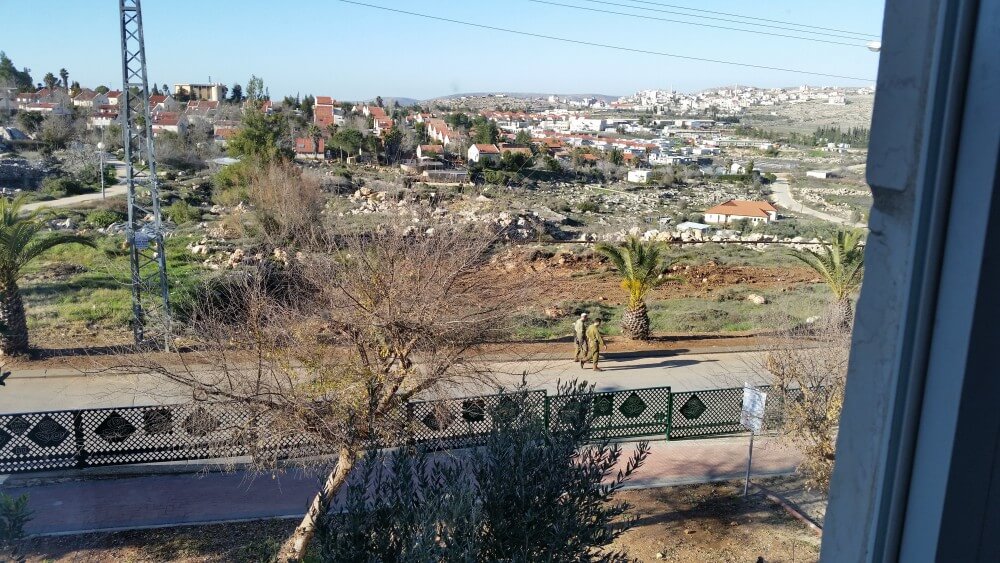
Soldiers walk on the Sabbath in Ofra settlement, January 16, 2016 (Photo: Philip Weiss)
I ask who killed Rabin, and a couple of people at the table say, Not Yigal Amir, the right-winger in prison for the crime. Others were behind the assassination. The guests tell stories about that fateful night in 1995 that undermine the official version.
It’s not the first conspiracy theory I’ve heard in the settlements. In Gush Etzion, David also said that Duma was not the work of Jews and pointed to discrepancies in the evidence. Then David showed me a picture of himself with 16 Palestinian workers on a construction site in a settlement and said that, to a man, these Palestinians asserted that the three settler teens famously killed in June 2014 not far from Gush Etzion weren’t killed by Palestinians. They died in a traffic accident, and the Israelis then concocted the story of the murder so that their army could go into Palestinian homes and steal money and jewelry. These theories strike me as evidence of the extreme pressure of such a conflict. When two sides are so opposed, the truth quickly gets politicized.
*******
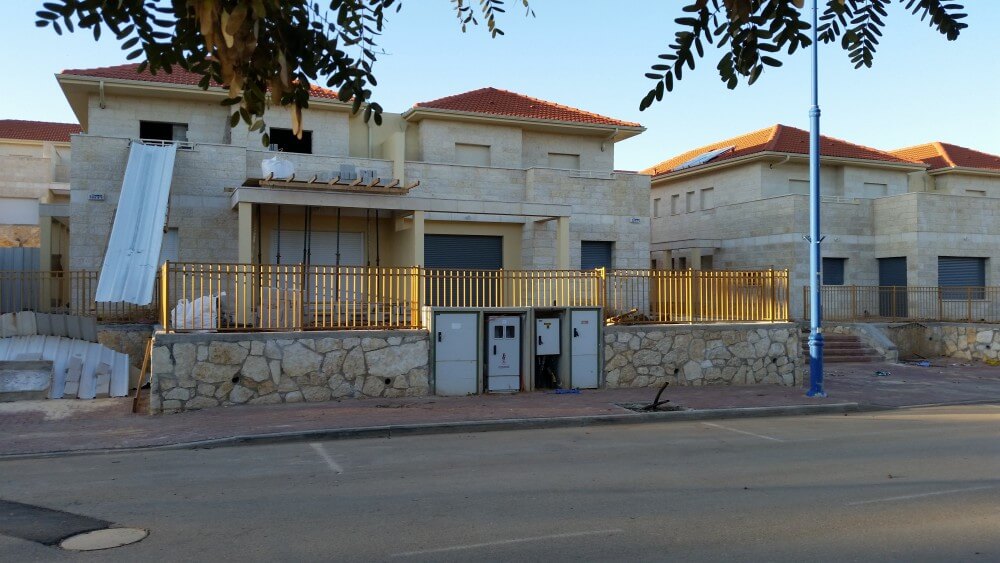
New construction of settlement McMansions, Ofra settlement, January 16, 2016 (Photo: Philip Weiss)
I spend the Sabbath walking around and having more political conversations. A Californian visiting his two sisters for a wedding says he admires what they are doing but tells me his sisters lead tough meager lives. He couldn’t do it. He is angry at American Jews for not being more supportive. “90 percent of them voted for Obama or don’t have religion. Half of them have never been here. They don’t understand that Obama hates Israel, isn’t good for Jews. They will vote for Hillary as the savior.”
A highly educated woman visiting from a more secular settlement, Efrat, says she leaves her house in the hands of a Palestinian friend, but there will never be a Palestinian state. “They missed their chance.”
Though she tells me that the Israeli political establishment hasn’t fully given up the two-state solution. I ask her, What if they cut a deal and she had to leave Efrat?
“No way,” she says.
This is the Israel I’m seeing up close, a tough Jewish center-right that dominates the political culture. It is the world that Haaretz columnist Ari Shavit speaks for when he justifies Netanyahu to the remnants of the left. It is no wonder that in the last election the Labourites called themselves Zionist Camp and said nothing about the peace process.

New construction in the Ofra settlement (Photo: Philip Weiss)
The settlers’ argument that they are merely the latest extension of Zionism makes perfect sense to me. They are continuing a project begun 100 years ago. Everywhere I go in the settlements, I’ve remembered Yousef Munayyer’s argument to Peter Beinart last June in New York that if you oppose the occupation it is pointless just to boycott settlements; the state and the broader society are all behind this growth. “The government supports settlement at any time,” Netanyahu says. I also remember Munayyer’s critique that the real problem is a Zionist ideology that puts Jews and their rights–and Jewish refugees and their rights–ahead of the people who were living in this land first, many of whom became refugees from Israel. My conversations with the settlers convince me viscerally of something I have only known from reading before: the conflict won’t end until that ideology of settler colonialism infused with religion ends, and everyone has equal rights. I know there is hatred and enmity on the Palestinian side too. It won’t make for a smooth transition. But as Munayyer says, westerners must begin to imagine what one state will look like.
A continual surprise of my tour is that the American media have done so little to tell Americans about the stick-to-itiveness of the settlers and their political support. Ze’ev Elkin and Avigdor Lieberman, whose houses I walked by, are very powerful men in Israel. The media’s failure gives me a sense of responsibility– to describe the discriminatory ideology of these colonists to Americans. Ari Shavit has argued what Avi also argued to me: Israel keeps American Jews Jewish, so they must support Israel. But anti-semitism in Europe, and assimilation in the United States (my decision to marry a non-Jew, which vexes my hosts) are not really important in this conversation. What matters is the discriminatory one-state reality before my eyes. It is the world that the Zionists made.
******
The Sabbath is ending, and I go for a walk among the children. Girls of 13 and 14 are holding a broad-jump competition. A dozen of them take it very seriously. They have made two marks in the road and make running starts and try to jump from one to the other. Their innocence and joy is moving; what a wonderful way to spend the day of rest.
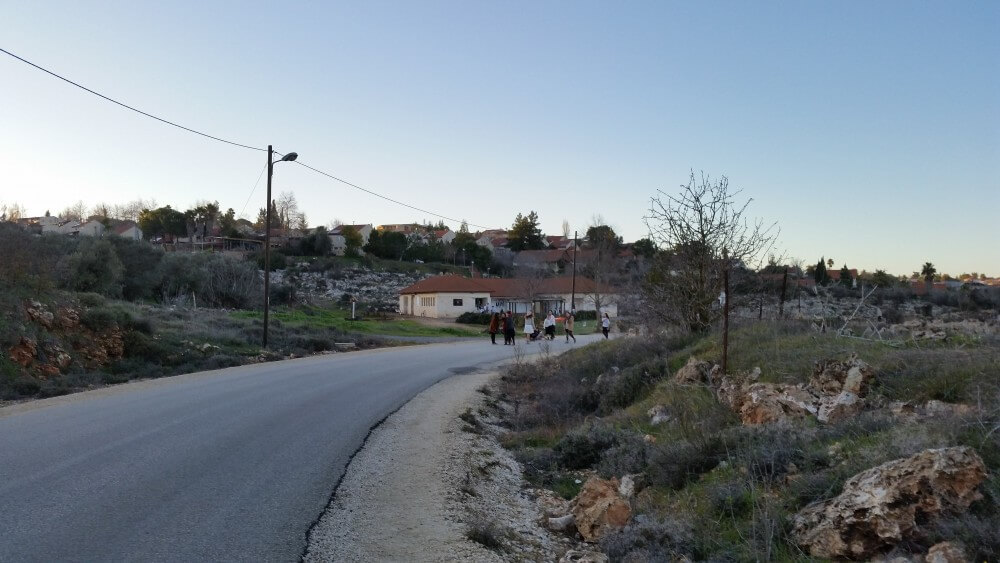
Settler girls have a jumping competition in the road on sabbath, Ofra, January 16, 2016 (Photo: Philip Weiss)
My walk takes me out into the wadi. I slosh through a bog to a little pond. Five adolescent boys have gathered there with a dog. The dog splashes in and out of the cold water and the boys make fun of me, as boys should. A couple of them wear yarmulkes but not all of them.
“Why are you here?” says a boy with long unruly blond hair and florid cheeks.
“I came to see, with my own eyes, the—”
“Occupation.”
“Yes. They say it is occupation,” I say.
“We love occupation.”
“They say that is the problem.”
“No, that is the problem.” He points at the Palestinian village to the north. “They are bad, we are good.”
“Some day you will live together,” I say.
“No,” says a guy with wild dark hair. “We don’t get along, Jew and Arabs. Once they were our slaves.”
“Holocaust,” says the blond guy.
“You’re joking,” I say.
“Yes. My grandfather was in Holocaust. Hungary.”
“Who did Duma?”
“Jewish. Jewish,” the boys agree.
“Yes, Jewish,” the blond kid says. “But they didn’t know– a baby. They want to burn a house. It is a small group.”
“What about the green line, what about the two state solution?”
He shakes his head. “That is the past.”
“So what is the answer?”
“I think one state, two—“
“Peoples?” I say.
“Two nations. Not religion and state together. Like USA.”
“That’s good,” I say, and shake his hand.
“We are the future,” he says.
Source Article from http://mondoweiss.net/2016/01/the-world-the-settlers-made
Related posts:
Views: 0
 RSS Feed
RSS Feed

















 January 26th, 2016
January 26th, 2016  Awake Goy
Awake Goy  Posted in
Posted in  Tags:
Tags: 
















